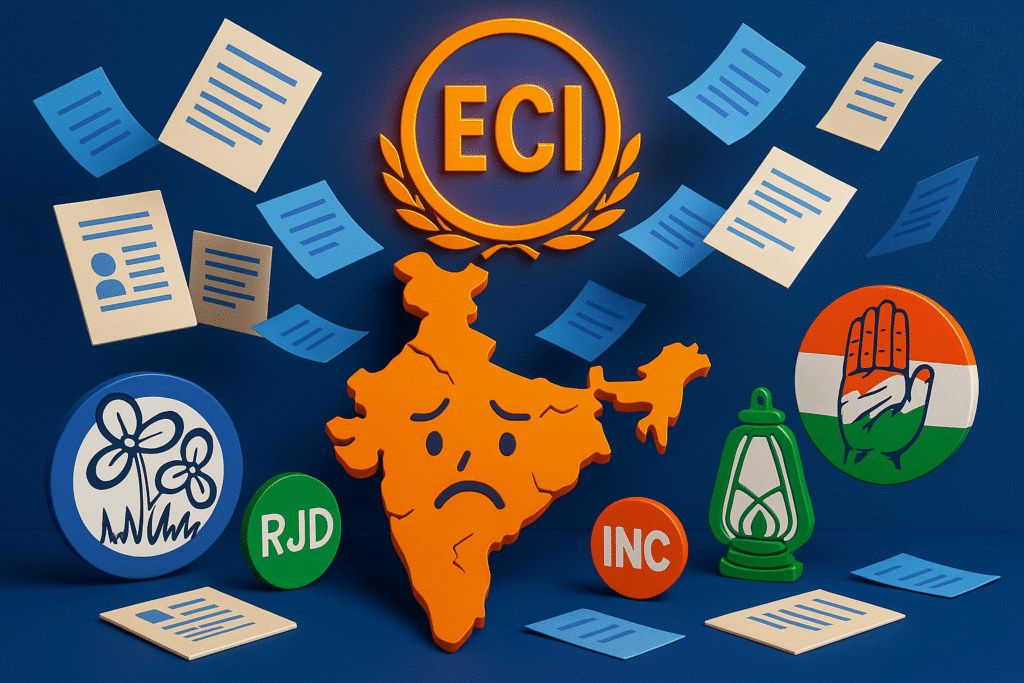INDI ALLIANCE erupts over Bihar’s voter audit. TMC, RJD, and Congress allege bias as ECI cracks down on illegal entries and duplication in electoral rolls.
Democracy’s Test in the Heartland
Like a bamboo caught in a storm, Bihar’s electoral framework bends—but refuses to break. Behind the uproar from the RJD, Congress, and TMC lies a contradiction as old as modern democracy itself: when state instruments are used to cleanse the system, is it enforcement—or authoritarian populism masquerading as reform?
Background & Context: Electoral Choreography Through Time
Since 1952, India has periodically revisited its voter rolls under the Representation of People Act and Article 324—yet the current “special intensive revision” (SIR) in Bihar has inflamed political faultlines. With cutoff years like 1987 and 2003, electoral authorities seek to root out duplicate registrations, illegal immigrants, and fraud. Opponents cry “backdoor NRC,” yet the practice has historical precedence in West Bengal, Delhi, and Jammu & Kashmir.
Surveys show upheavals—narrow contests that shrank safe seats and revived older patterns. A 2014 University of Jammu study exposed that voter roll bloating in previously secure Hindu regions upended margins. The trend accelerated with Rohingya impunity and Bangladeshi migrations, prompting today’s reality: the electorate is no longer static, but a dynamic theatre of demographic upheaval.
Main Argument: The Muscle Behind Democracy—or Its Erosion?
The Election Commission of India’s SIR targets millions: nearly 5 crore voters in Bihar added after 2003 must now resubmit enumeration forms; the remaining 2.9 crore post-1987 registrants are subject to additional document checks like birth certificates and parental IDs. Aadhaar doesn’t suffice—an implicit rejection rooted in its non-citizen resilience.
This muscular diplomacy—bureaucratic muscle rather than geopolitical—aims to reinforce democratic integrity. Yet, these revisions reverberate with normative tensions: Are we purging illegality, or choking dissent? Is this rigorous revalidation, or a selective disenfranchisement of certain communities?
Opposition leaders decry the exercise as unconstitutional suppression of SC/ST/OBC/minority votes. But constitutional scholars note SIR’s legal moorings in Sections 21(3) and 34 of the RP Act. This game of strategic ambiguity lets both democracy and authoritarian populism claim the high ground.
Irony & Contrasts: Sovereignty Within a Global Flashpoint
Here’s the deeper irony: as India asserts its regional agency against Chinese and American hegemony, it must also reassert electoral sovereignty at home. Bihar becomes China’s mirror—a test case for India’s middle power credentials. If sovereignty falters at domestic governance, how can India credibly project itself in BRICS, ASEAN, or G20 negotiations?
Just as global rivals tighten their border defences and digital surveillance under the guise of national security, India’s electoral rollback exercises mirror these global trends, emerging from realpolitik and geopolitical choreography. The risk: rolling back citizenship rights under the cover of democratic policing.
Geopolitical Framing: Multipolar India’s Domestic Crucible
In Asia’s emerging multipolarity, India stands at a fulcrum, often caught between US–China tensions. Yet the strength of its narrative depends on internal consistency. A democracy cannot champion human rights abroad while tolerating diluted civic rights at home. Bihar’s SIR thus becomes a microcosm—whether India honours its democratic claim as a responsible global middle power.
The SIR also reflects muscular diplomacy at home—reasserting state authority—but must avoid sliding into coercive governance. The calculus is double-edged: cleanse the repository of democracy, or create distrust among historically marginalised communities?
Thought-Provoking Finale: Sovereignty’s Paradox
Silence, in this context, is not diplomacy—it is surrender. India must speak—constitutionally, inclusively, transparently. The alteration of electoral rolls is not a distant policy tweak—it’s democracy’s litmus test.
India, emerging as a Global South standard-bearer, must prove its procedural justice internally. As great-power posturing intensifies—digital currencies, maritime tensions, climate accords—the outcome in Bihar sends ripples across global democracy.
Will Bihar’s citizens stand validated or shy away? Will India’s democracy re-emerge stronger, or fracture under ideological populism? The answer rests in the coming months—and echoes on the global stage.

